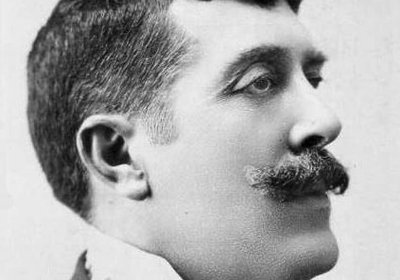-

-
The Discerning Mollusk's Guide to Arts & Ideas
-


ean Lorrain (1855–1906) was the pseudonym of Paul Alexandre Martin Duval. He was born on 9 August 1855 in Fécamp, Seine-Maritime, France and by the time he was twenty-five, he was one of the leading figures of the Decadent Movement and the author of numerous novels, volumes of poetry and short stories. He was also associated with the Symbolist school and can be seen as a key literary figure who successfully made the transition from Symbolist to Decadent. Lorrain was a dedicated disciple of dandyism and spent much of his time amongst the fashionable artistic circles in France, particularly in the cafés and bars of Montmartre.
In 1897, he was challenged to a duel by Marcel Proust because Lorrain had publicly questioned the nature of Proust’s relationship with Lucien Daudet, implying they were lovers. Proust challenged Lorrain to a pistol duel to defend his honour and his reputation against the accusations. Both men survived the duel.
Lorrain was openly homosexual, often citing ancient Greece as the noble heritage for his homosexuality. He became colloquially known as ‘The Ambassador of Sodom’. He began to use morphine as a way of combatting symptoms of tuberculosis. When that failed, he moved on to ether, a habit he shared with Guy de Maupassant. Lorrain wrote a handful of horror stories under the influence of ether, but he eventually abandoned its use when the substance gave him stomach ulcers and associated health problems.
By the 1920s, despite being the author of fourteen novels, five poetry collections, twenty novellas, fifty-eight short stories, ten plays, three travel books, and a libretto, as well as hundreds of pieces of journalism that he had contributed to the satirical weekly Le Courrier français, Jean Lorrain had been virtually forgotten by the literary world, his works overshadowed by the achievements of Baudelaire, Poe, Stenbock, Wilde, Huysmans, and Rachilde.
Lorrain is one of those literary figures whose life and art were bound together into the an almost seamless whole. He embodied, more inescapably than anyone else, the absurdities, the affectations, the paradoxes and the perversities of the Decadent lifestyle and the Decadent world-view.
His most successful Decadent novels were Monsieur de Bougrelon (1897), and Monsieur de Phocas (1901); Sensations et souvenirs, published in 1895, was his most successful short story collection.
Although his novels and stories are written in another time, as well as in another language, Lorrain’s detailed descriptions of fin-de siècle France, the feverish, nightmarish atmosphere of his wonderfully decadent and sophisticated tales, mean that he can be considered to be one of the true chroniclers of the fin-de-siècle. His subtle social commentary is evident in stories in which he effortlessly conveys the particular sensibility of La Belle Epoque.

R.J. Dent is a poet, novelist, essayist and translator. He has written three novels, a book-length study of Emily Dickinson’s poetry and a true crime book about Blanche Monnier. He has also translated several European classics into English, including works by Baudelaire, Sade, Lautréamont, Jarry, Breton, Louӱs, Artaud, Crevel and Ėluard. His website is www.rjdent.com.